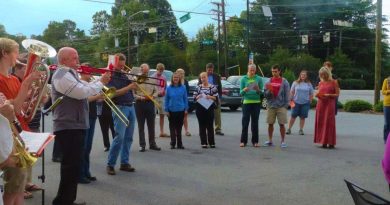To Love and To Be Loved
This sermon was preached on February 25, 2018. A Church Council was held after worship that Sunday and the attached resolution was discussed and approved.
I’ve heard it said that “human beings may not be the only creatures who know they are going to die, but we’re the only ones who wonder why we live.” What’s our purpose here? Today’s sermon offers my answer to this question: we are on this earth to love and to be loved.
I believe this is the message Jesus came to teach. The mind of Christ reveals a particular understanding of life’s purpose. What is the greatest commandment? According to Jesus, it is this: “You are to love the Lord your God with all your heart and soul and mind and to love your neighbor as yourself.” What is Jesus’ final instruction to his disciples? “A new commandment I give you: love one another. As I have loved you, so you must love one another.”
Sounds simple enough but we all know that “loving one another” is easier said than done. It is to say we have our conflicts and disagreements with one another. Living with this tension, faithful people still profess love. We mouth the phrase “love the sinner, hate the sin,” but does love truly undergird our relationships? If we’re very critical of one another, are we truly demonstrating love?
The movie, Lady Bird, is a coming of age story with the teenage protagonist’s name as the title. The heart of the story has to do with the relationship between 18 year-old Lady Bird and her mother, Marion.
Viewing the world of parenting a teenager through Marion’s eyes, we recognize the fine line between being critical and being helpful. Mom wants to be helpful, but to her daughter, every criticism comes across as a stab to the heart. In a poignant scene, the teenager asks her mother, “Why can’t you say I look nice?” “I thought you didn’t even care what I think,” her mother counters. “I’m sorry, I was telling you the truth. Do you want me to lie?”
“I just wish … I wish that you liked me,” Lady Bird says sorrowfully. “Of course I love you,” the mother replies. “But do you like me?” Lady Bird wonders aloud. And in response her mother expresses the stiflingly parental expectation that is: “I want you to be the very best version of yourself that you can be.” “What if this is the best version?” Lady Bird asks.
Faithful people profess love for others. It’s the way of Jesus. But I’m not sure that the church always communicates God’s love in a way people can hear. For indeed, there are beliefs and behaviors we don’t like. “Love the sinner, hate the sin.” Church fights often have to do with differences of opinion about the best version of the church.
The disagreement within the church about welcoming and affirming LGBTQ+ people can be understood as a conflict about what’s best. There’s nothing new here—versions of this kind of conflict have been in the church from the beginning when the disagreement was: Jew or Gentile, what is best? Viewpoints within the church have changed but conflict remains. What is best?
There was a time when the segregation of blacks from whites was deemed best in the world and in church. When I was a teenager, I had a neighbor who was both a pillar of his church and a racist. He opposed the “mixing of the races.” “If God wanted blacks and whites to marry,” the man pronounced, “He would have made us gray.” How does one respond to this?
In my first year out of seminary, I visited with an older member of the congregation, who objected to women being ordained. “A woman can’t be a preacher,” she declared. How does one respond to this?
There have always been different opinions about what’s best within the church. In today’s text, Paul addresses a church in conflict, the Christian community in Philippi. In this text, Paul’s words are addressed not primarily to individuals, but to the entire Christian community.
“Let each of you look not to your own interests, but to the interests of others. Let the same mind be in you that was in Christ Jesus” (Philippians 2:4-5). In the Greek translation, the word translated “you” refers to the gathered church at Philippi, not to individual members. Someone can read this text about the mind of Christ as an exhortation to personal piety, but the text is best heard as a word for the entire church. As a gathered faith community, we are invited to imitate Christ’s self-emptying, to take the role of the servant.
Church, take on the role of serving one another. Let go (empty yourselves) of the need to act like God. Turn from self-preoccupation and be attentive to others. Among us, let there be encouragement in Christ, consolation in love, and sharing in the Spirit.
We must let go of anything that’s keeping us from being attentive to one another. Can we let go of our opinions about what’s best for someone else? We have our firmly held beliefs about what’s best—which explains, I think, why change is so difficult. Yet, change is happening around us.
Ask the Boy Scouts about this. Did you know that women were not allowed to serve as volunteers in the Boy Scout program until the late 1980’s? The name speaks for itself: Boy Scouts of America. Until the late 1980’s, the organization did not allow women to be leaders within this group. The rationale: women have the Girl Scouts of America.
It was a single mom who had a son in the scouting program in another state who challenged this idea, and Boy Scout Troop 346 has benefited from her actions. Over the last 20+ years, women have been able leaders of the troop our church sponsors.
Several years ago, the scouting program went through another change: the development of a policy of having no openly gay members. When this ban was overturned, some churches ended their support of the scouting program, but this did not happen at Raleigh Moravian. In fact, there was very little conversation about the change in policy. The fine work of our troop continued without disruption.
Why wasn’t this change a bigger issue within our troop and congregation? It seems to me that part of the answer has to do with the fact that some of the young men who went through the ranks in our scouting program later identified (when they were in college) as being gay.
When they were members of our scouting program, they were not open about their sexual orientation but later when they were, there was no reconsideration of the favorable opinion of them held by our leadership and other scouts. All of them were good scouts.
Am I wrong in assuming there will soon be a similar response within our congregation? At Church Council later today, we will have the opportunity to affirm our welcome of all God’s children, regardless of their race, gender identity, age, national origin, or sexual orientation. I see this happening because in significant ways change has already taken place.
“If God wanted blacks and whites to marry, He would have made us gray.” How does one respond to this? In our congregation a handsome young white man is engaged to marry a beautiful black young woman. The couple met in our youth group. Love blossomed on a mission trip. And though a date for their wedding as not been set, they will be married in our sanctuary.
“A woman can’t be a preacher.” How does one respond to this? In our congregation there have been many women (from Carol Foltz up to and including Barbara Styers) who have preached from this pulpit. I can name at least 10 women who have preached here, and I’m sure there are others too. And, of course, just last Sunday our church hosted the ordination service for Fran Saylor, a woman whose pastoral gifts and commitment to the way of Jesus are celebrated among us.
So yes, I envision a time when individuals as well as couples who share a same-sex attraction can live openly and freely among us. We will get to know one another and realize we have things in common—like ACC basketball and BBQ and knowing by heart all of the words to the hymn “Jesus Makes My Heart Rejoice.” There will be thoughtful conversations about our shared life and faith. There will be much to admire and enjoy in these developing relationships within this gathered community of God’s people. I envision this. Do you?
Of course, I also imagine someone from another church saying: “Is it true that you all have members in your congregation who are homosexual?” How does one respond to this? I imagine myself saying, “Yes we have gay and lesbian members. To be honest, everyone did not easily embrace this at first but it’s who we are now. The mind of Jesus—revealed among us—has directed us in various ways (and with various people) to what’s most important: to love and be loved. This is why we’re here.
Craig Troutman
Raleigh Moravian Church
February 25, 2018



